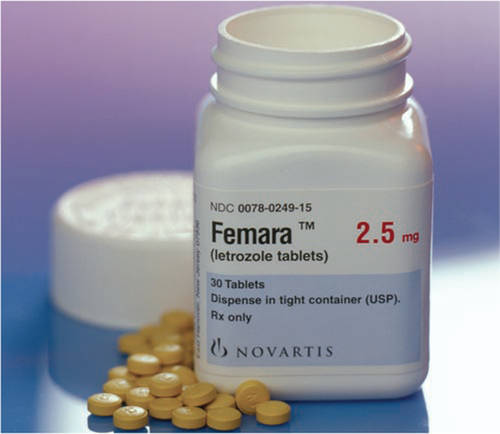Letrozole 2.5 Mg (Femara): Uses, Dosage, Side Effects, Ban, FAQs

What is Letrozole 2.5 mg?
Letrozole, more commonly known by the brand name Femara, is an aromatase inhibitor that is used to treat early breast cancer in women who have experienced menopause (change of life; end of monthly menstrual periods) and who have had other treatments, such as radiation or surgery to remove the tumor. It is also used to treat early breast cancer in women who have experienced menopause and who have already been treated with a medication called tamoxifen (Nolvadex) for 5 years.
Letrozole 2.5 mg is also used in women who have experienced menopause as a first treatment of breast cancer that has spread within the breast or to other areas of the body or in women whose breast cancer has worsened while they were taking tamoxifen.
Letrozole 2.5 mg is sometimes used off-label for fertility. It can be an effective fertility treatment for women with ovulation problems, or for those with unexplained infertility.
How does Letrozole 2.5 mg work?
Letrozole is in a class of medications called nonsteroidal aromatase inhibitors. Letrozole 2.5 mg works by decreasing the amount of estrogen produced by the body. This can slow or stop the growth of some types of breast cancer cells that need estrogen to grow.
When you take the drug for fertility, it stops androgens in your body from converting into estrogen. When estrogen is blocked, the pituitary gland gets a message that it needs to produce follicle-stimulating hormone (FSH), which stimulates the ovary to produce an egg.
How should I take Letrozole 2.5 mg?
Letrozole 2.5 mg comes as a tablet to take by mouth once a day with or without food. Take Letrozole 2.5 mg at around the same time every day. Follow the directions on your prescription label carefully, and ask your doctor or pharmacist to explain any part you do not understand. Take Letrozole 2.5 mg exactly as directed. Do not take more or less of it or take it more often than prescribed by your doctor.
You may need to take it for several years or longer. Continue to take Letrozole 2.5 mg even if you feel well. Do not stop taking letrozole without talking to your doctor.
Ask your pharmacist or doctor for a copy of the manufacturer’s information for the patient.
What happens if I miss a dose of Letrozole 2.5 mg?
Take the medicine as soon as you can, but skip the missed dose if it is almost time for your next dose. Do not take two doses at one time.
What happens if I overdose on Letrozole 2.5 mg?
Seek emergency medical attention or call the Poison Help line at 1-800-222-1222.
What should I avoid while taking Letrozole 2.5 mg?
Avoid caffeine (tea, coffee, cola, and chocolate). You can find the full list of foods to avoid in this article. You should also avoid driving or doing any hazardous activity until you know how this medicine will affect you. Your reactions could be impaired.
What are the side effects of Letrozole 2.5 mg?
Common side effects of Letrozole include:
• hot flushes
• night sweats
• nausea
• vomiting
• loss of appetite
• constipation
• diarrhea
• heartburn
• stomach pain
• changes in weight
• muscle, joint, or bone pain
• excessive tiredness
• headache
• dizziness
• weakness
• swelling of the hands, feet, ankles, or lower legs
• difficulty falling asleep or staying asleep
• vaginal bleeding or irritation
• breast pain
• hair loss
• blurry vision
Serious side effects
• chest pain
• rash
• hives
• itching
• difficulty breathing
• unusual bleeding or bruising
• pain in the upper right part of the stomach
• yellowing of the skin or eyes
• flu-like symptoms
• pain, warmth, or heaviness in the back of the lower leg
• severe headache
• sudden speech problems
• sudden weakness or numbness of an arm or leg
Letrozole may cause or worsen osteoporosis. It can decrease the density of your bones and increase the chance of broken bones and fractures.
What other drugs will affect Letrozole 2.5 mg?
Other drugs may affect letrozole, including prescription and over-the-counter medicines, vitamins, and herbal products.
- Serious interactions of letrozole include:
- ethinylestradiol
- tamoxifen
- Moderate interactions of letrozole include:
- cholera vaccine
- eluxadoline
Tell your doctor about all your current medicines and any medicine you start or stop using.
Frequently Asked Questions About Letrozole
What does letrozole do for fertility?
In the simplest terms, Letrozole induces ovulation. Letrozole is an oral fertility medication that is a helpful aid to induce an egg to develop and be released in women. It is used to induce ovulation in women who cannot ovulate or to help produce multiple eggs in women who already ovulate on their own.
Why was letrozole banned?
A study found that congenital cardiac anomalies were significantly higher in the clomiphene group compared to the letrozole group this led India to ban the usage of letrozole in 2011, citing potential risks to infants.
Why is letrozole not FDA approved?
There is a large body of medical research showing that letrozole, when taken briefly early in the menstrual cycle, increases the production of the hormone FSH and can promote ovulation in patients who are not ovulating. Letrozole is not FDA-approved for the treatment of infertility and ovulation.
While not FDA-approved as a fertility treatment, letrozole is considered a first-choice option for improving fertility in people with PCOS. Letrozole has been shown to work as well, if not better, than clomiphene at stimulating ovulation, as well as leading to successful pregnancies and live births.
Can letrozole cause twins?
The risk of twins with letrozole is estimated to be approximately 3-5%, which appears to be lower than the risk of twins with clomiphene citrate (7-8%), but is still higher than the risk of twins in a spontaneous pregnancy (2-3%). Although triplets and higher-order pregnancies are rare, these may occur <1% of the time.
Does letrozole make your hair fall out?
Yes, letrozole, is a selective estrogen receptor modulator is known to cause male pattern baldness or hair thinning in women.
What vitamins should I take while on letrozole?
Patients who received letrozole for a longer duration have a low concentration of serum 25 (OH) vitamin D. Vitamin D3 and calcium supplementation in these patients has been shown to increase the concentrations of calcium, phosphorous and decreased the concentrations of parathyroid hormone and alkaline phosphatase.
Does letrozole cause joint stiffness?
Yes, it is common to experience painful joints when taking letrozole to treat breast cancer.





